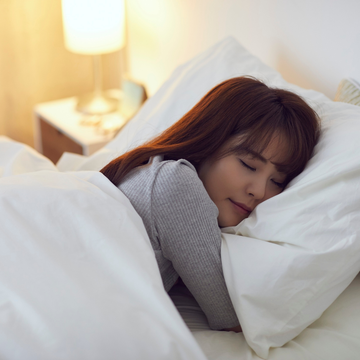The Science Behind Sleep and Touch
Most people think good sleep depends on darkness, silence, or fewer screens. But few realize that the fabric touching your skin plays a major hormonal role. Your skin isn’t passive — it’s a neuroendocrine organ that communicates with your brain through touch.
When your skin feels soft, breathable textures, it triggers your parasympathetic nervous system, the “rest and digest” mode that lowers stress and slows your heart rate. That’s when cortisol drops and melatonin rises, helping your brain transition into deep sleep.
What Happens When Fabric Feels Wrong
-
Rough, synthetic fabrics like polyester or blends cause micro-irritation.
-
Your body interprets that friction as discomfort or mild stress.
-
Cortisol (stress hormone) stays elevated — your brain stays alert instead of resting.
-
You might fall asleep, but you won’t stay in deep, restorative sleep.
-
This leads to grogginess, poor recovery, and hormonal imbalance even after eight hours in bed.
Temperature = Hormonal Harmony
Your body naturally lowers its core temperature during slow-wave sleep.
If your sheets trap heat, your brain can’t enter this stage properly.
That’s why temperature regulation is a key hormonal trigger.
Egyptian cotton helps maintain thermal neutrality because:
-
Long-staple fibers allow microscopic airflow.
-
It absorbs excess heat and moisture, keeping the skin dry.
-
It maintains an ideal skin temperature, allowing melatonin to stay high and cortisol to stay low.
This stable microclimate around your skin lets your hormones do their job uninterrupted.
The Oxytocin Factor: Why Softness = Calm
-
Research from Frontiers in Neuroscience shows that soft textures activate the somatosensory cortex, releasing oxytocin — the “calm and bonding” hormone.
-
Oxytocin lowers anxiety, promotes emotional stability, and helps your body relax deeply.
-
The smoother the surface against your skin, the more oxytocin activity you get — meaning softer sheets literally make your brain calmer.
Synthetic fabrics often disrupt this by creating subtle friction, which increases alertness instead of relaxation. Natural fibers like Egyptian cotton, on the other hand, sustain oxytocin’s calming effect throughout the night.
Why Egyptian Cotton Is the Smart Choice
-
100% natural and Oeko-Tex certified — no harmful dyes or chemicals.
-
900-thread-count weave offers maximum softness with breathability.
-
Long fibers mean fewer friction points and longer lifespan.
-
Supports healthy skin microbiome — important for eczema and acne-prone users.
-
Scientifically proven to regulate temperature and enhance hormonal recovery.
So while most people think premium bedding is just about luxury, Egyptian cotton is actually bio-optimized for better hormonal balance and deeper sleep.
Hormonal Benefits in Simple Terms
-
Cortisol ↓ — Lower stress response thanks to tactile calmness.
-
Melatonin ↑ — Deeper sleep through thermal balance and relaxation.
-
Oxytocin ↑ — Emotional calm from soft textures and sensory satisfaction.
Your bedding directly influences these hormones. The better your fabric, the better your body can regulate its natural sleep chemistry.
The Final Takeaway
If you’ve been waking up tired, restless, or stressed, it might not be your lifestyle — it could be your bedding. The wrong fabric keeps your body chemically alert all night. The right one allows your hormones to rebalance naturally.
Katin Life’s 900TC Egyptian Cotton Collection is designed to support your body’s hormonal recovery cycle. Every thread, every weave, every certification serves one purpose — to help your skin and hormones rest in harmony.
Chat with us directly on WhatsApp for personalized recommendations:






